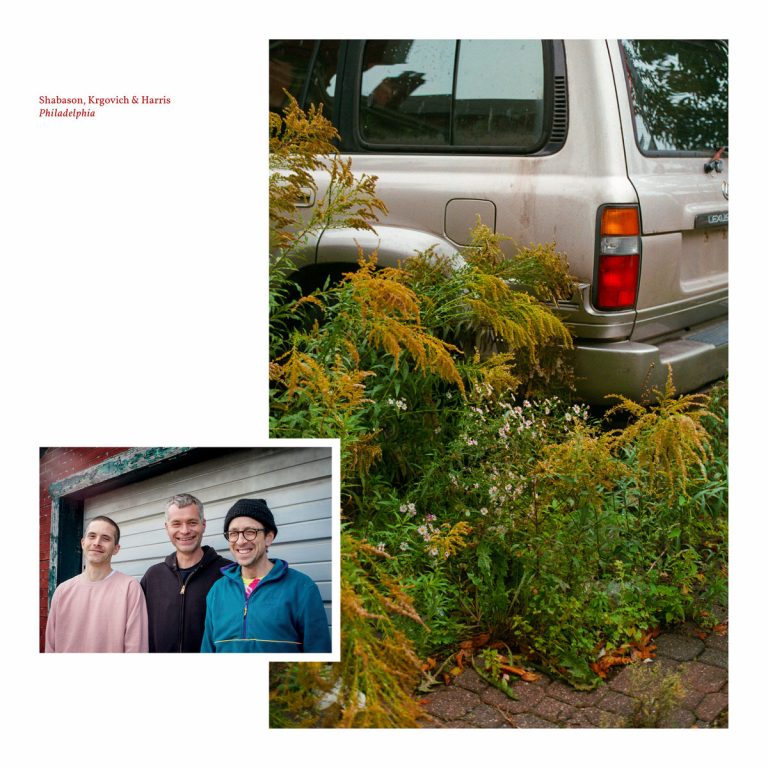So much of the lore surrounding Philadelphia is centred on the aesthetics of Japanese New Age music, that it’s almost a shock that the album following the gorgeous single “Osouji” actually hasn’t all that much to do with its parent genre. Instead, it’s a legitimately illuminating puzzle piece on the psychological effects of 2020 and the progressively more impactful aesthetic landscape of online music sphere. Philadelphia is art-pop in the most literal sense, but there are thematic undercurrents here that unite trends which functioned as the post-cultural subconscious of the last decade – and in that, it’s unique.
Maybe that’s why the product of the three Canadian jazz and art-pop musicians Shabason, Krgovich & Harris feels more at home in dimly-lit bars than in afternoon mom-meditation circles. There’s not a lot of kitsch here – the lyrics don’t dwell on fantasy landscapes, but describe banal, mundane everyday routine. The reason why this isn’t ever boring is, as everything about this record, the end product of a very intricate combination of reference points, which all lead back to the same philosophy of Western aesthetics being re-defined via perspectives and aesthetics of Asian iconography.
What will strike most on first listen is that the record feels adjacent to the type of music found on countless ‘chill’ and ‘study’ YouTube playlists, which in itself is following a linked chain of influence – nature-fixated vaporwave is a direct product of Hiroshi Yoshimura’s minimalist synth compositions, which was a development out of Brian Eno’s ambient experiments.
Removed from the constraints of pedantic genre discourse, the continuous ‘chill out’ mixes provided an often-teenage audience, who are removed from negative critical elitism, towards the genre with a fairly novel experience: an embrace of fairly urban minimal compositions cloaked in pastoral traditional instrumentation and natural field recordings. But, there’s also a clear inspiration of ‘plastic soul’, like David Sylvian and – surprisingly – Hot Chip and Paul McCartney. Described by David Bowie in an interview for Playboy magazine as “the squashed remains of ethnic music as it survives in the age of Muzak, written and sung by a white limey,” the term rings faintly true for a trio of white Canadian men singing about showers before bedtime in an age marked by political nihilism and public unrest.
But this is no put-down. Philadelphia’s magnificence lies in recreating a soundscape that feels like the quintessential definition of the Japanese aesthetic philosophy wabi-sabi, a concept roughly translatable as the beauty of the imperfect, of becoming or fading, of an all-permeating subtlety. In Japan, those are considered qualities inherent to nature which, when adapted by humans into their everyday life or artistic ambitions, reach almost ethical standards associated virtue. Zen philosophy defines seven principles as the cornerstones of wabi-sabi – most characteristic for the approach of the Canadian trio would be those of asymmetry (Fukinsei), simplicity (Kanso), subtlety (Yūgen) and tranquillity (Seijaku). The slightly distorted synth tones insinuate Fukinsei, the overall minimalism Kanso, and the relaxing field recordings and everyday lyrical themes Yūgen and Seijaku.
The elegance of the trio’s songs “Open Beauty” or “Sun in the Kitchen” thus doesn’t derive itself from a simple nostalgia for 80s synth ballads, but of a borderline lyrical approach to music, beyond instrumentation or reference. This also aligns the album with the concept of Shibui, in which textures bridge and balance complex structures with subtle design without exaggerating imperfections, which in turn is an issue with some works too intent to be waba-sabi, ultimately making them seem artificial (an issue Air’s underrated but stilted Pocket Symphony faced). Thankfully, Shabason, Krgovich & Harris are too respectful to their compositions and use Western instrumentation skilfully and tastefully.
In that, Philadephia becomes political: recorded before the quarantine, it somehow managed to perfectly characterize the strange experience of forced reclusion the world experienced. Removed from the unpleasant anxieties associated with a pandemic, it feels like an assuring, didactic look at modern life. Sparkling electric guitar chords meet wooden percussion and Japanese bells, sapphire synthesizers respond to the calls of tropical birds. Maybe the comfort of a basil-ginger-orange soda – its strong green the colour of the jungle – can be a brief, pleasant uplift from the dark of the void.
Maybe the title – with its reference to the trio’s Angelo Badalamenti-like cover of Neil Young’s track for the AIDS-themed Hollywood movie – functions as a revisionist take of the rather chaotic city. Thus, “I Don’t See The Moon,” with its repetitive, jazzy second half, becomes almost like a mission statement, accepting lack of direction as the ability to meditate. “Friday Afternoon” (an Eno reference?) provokes us to confront failure (here: a broken down car) as possible inspiration, while its sister-track “Tuesday Afternoon” marries vaporwave aesthetics with Air’s alien, cosmic beauty.
All those communions make perfect sense – after all, David Lynch’s experience of leaning against a hot car brought us the ‘Red Room’. Allowing us to embrace melancholy, and to a degree celebrate both routine and disruption, Philadelphia brings grace and elegance to an era removed from spiritual insight. In that, it is deeply philosophical and absolutely necessary.

